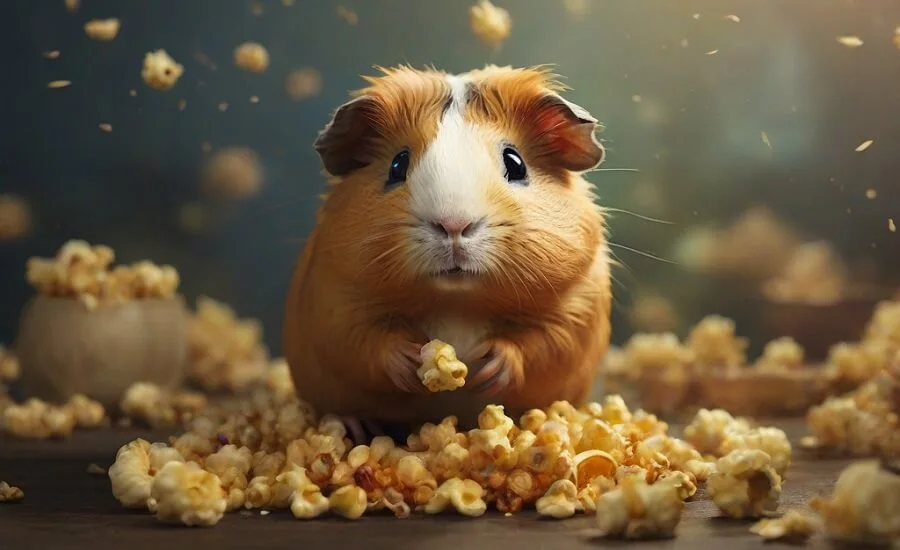Unique Anatomy and Physiology
Sweat From Their Feet?
Yes, you read that right! Guinea pigs may not have armpits, but they do have sweat glands in their feet. These special glands help them regulate their body temperature.
Super Sniffers
Guinea pigs have noses that put our own to shame. Their sense of smell is almost 20 times better than ours, allowing them to detect the faintest scents in their environment. This keen sense helps them find food and stay safe from predators.
Eyes With A 360-degree View
With eyes on the sides of their heads, guinea pigs have a nearly 360-degree field of vision. This unique adaptation allows them to see almost everything around them, alerting them to potential danger.
Four Toes In Front, Three In Back
Another interesting physical feature is their different numbers of toes. Guinea pigs have four toes on their front feet and only three on their back. This helps them grip the ground and climb with greater stability.
Growing Teeth, Never-Ending Chew
Guinea pig teeth are constantly growing! They need plenty of hay and other chew toys to gnaw on to keep them worn down and healthy.
Pups Born Ready To Run
Baby guinea pigs, called pups, are quite intelligent. They are born with fur, eyes open, and the ability to run within hours of birth!
Coprophagy: A Natural Recycling System
What might seem strange to us is a normal behavior for guinea pigs. They practice coprophagy, which means they eat their poop. This helps them absorb essential nutrients that they wouldn’t get otherwise.
To learn more about this read Why Do Guinea Pigs Eat Their Poop?
Interesting Behaviors and Communication
Chatterboxes of the Pet World
Did you know guinea pigs are incredibly vocal creatures? They use a wide range of sounds to communicate with each other and their owners. These include excited whistles, chirps, calming purrs, and even annoyed hisses and chattering teeth.
Popcorning for Joy

Have you ever seen your guinea pig jump straight up in the air, twist around, and land with a tiny squeak? This adorable behavior, known as “popcorning,” allows guinea pigs to express their happiness and excitement.
Short Sleeps Throughout the Day
Unlike humans, who sleep for several hours in a single stretch, guinea pigs take short naps throughout the day. They can be awake for up to 20 hours, making them crepuscular creatures most active during dawn and dusk.
Social Butterflies
Guinea pigs are not meant to be solitary animals. They thrive on companionship and enjoy interacting with other guinea pigs. Whether it’s cuddling together for warmth or engaging in playful chases, their social bonds are essential for their well-being.
Trick Masters in the Making
While often underestimated, guinea pigs are surprisingly intelligent creatures. With patience and positive reinforcement, they can be trained to perform various tricks, like coming when called, going through tunnels, and even spinning in circles!
A Sense of Community
Guinea pigs can recognize their family members and develop strong bonds with them. They often form complex social hierarchies within their groups, communicating through scent markings and subtle vocalizations.
Stress Can Take a Toll
Being sensitive creatures, guinea pigs can easily become stressed by loud noises, sudden changes, and unfamiliar environments. It’s important to provide them with a calm and predictable environment to ensure their happiness and health.
Perfect Companions for All Ages
With their gentle nature and relatively low-maintenance needs, guinea pigs make wonderful pets for families with children of all ages. They offer hours of entertainment and can teach valuable lessons about responsibility and compassion.
Surprising Historical Significance and Diverse Breeds
A Legacy from the Incas
The Incas first domesticated Guinea pigs in South America over 5,000 years ago. Initially bred for food and religious purposes, they held a significant cultural and economic role in ancient Andean societies.
Scientific Pioneers
These furry creatures have played a vital role in scientific research. Their unique physiology, particularly their inability to synthesize vitamin C, made them invaluable subjects for studying various nutritional deficiencies and diseases.
Global Pet Popularity
Guinea pigs have captured the hearts of pet lovers worldwide for centuries. Introduced to Europe by Spanish conquistadors in the 16th century, they quickly became popular among royalty and nobility. Their popularity has continued to grow ever since, making them beloved companions in countless homes.
Celebrating Diversity
Today, there are over 20 recognized breeds of guinea pigs, each with its own unique appearance and personality. From the sleek and short-haired Abyssinian to the long and flowing Peruvian, there’s a guinea pig to suit every preference.
Oldest Guinea Pig on Record
The oldest guinea pig ever recorded lived to be an impressive 14 years and 10 months old! This heartwarming story highlights the potential lifespan of these beloved pets with proper care and attention.
A World of Special Needs
Due to their sensitive nature and specific dietary requirements, guinea pigs have unique needs that must be met for them to thrive. Providing them with spacious enclosures, enriching environments, and a healthy diet is crucial for their well-being.
Stress Management is Key
Creating a calm and predictable environment is vital for guinea pigs’ mental health. Gentle handling, familiar routines, and minimizing loud noises can help them feel secure and prevent stress-related health problems.
A Rewarding Adventure
Caring for guinea pigs comes with countless rewards. Their playful personalities, adorable antics, and affectionate nature can bring joy and laughter to any household.

